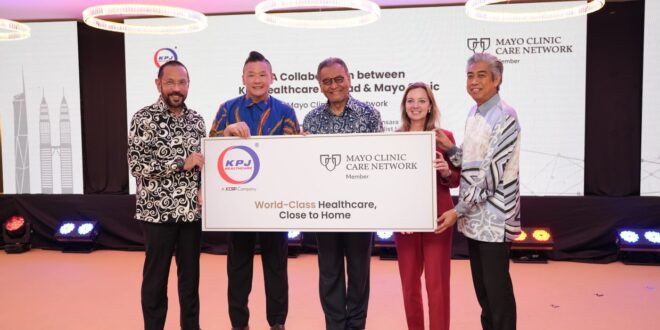KUALA LUMPUR: A digital transformation needs to take place in the Malaysian healthcare system in the form of an electronic lifetime health record to strengthen the public and private healthcare sectors.
Health Minister Datuk Seri Dr Dzulkefly Ahmad said the electronic medical record (EMR) for each citizen was most required to establish one master patient index to access healthcare records anywhere in healthcare facilities throughout Malaysia.
He said this was the digital architecture that the ministry wanted to introduce throughout the country.
“We are keen to get this taken care of by one vendor, we also want a healthy competition from all providers to deliver this (system).
“I want to see Malaysia having its own central record system maybe within the next four years.
“We are already seeing a semblance of this within our clinics,” he told a press conference at Damansara Specialist Hospital 2 here, after officiating KPJ Healthcare and Mayo Clinic strategic collaboration with two specialist hospitals – KPJ Damansara Specialist Hospital and Damansara Specialist Hospital 2.
The historic milestone marks Malaysia’s first entry into the Mayo Clinic Care Network, which signifies KPJ Healthcare’s commitment to leveraging global insights in driving medical excellence and patient care innovation, establishing a new standard for the healthcare landscape in the nation.
In his speech earlier, he said the public and private healthcare sectors were yet to be perfectly integrated with one another.
“The public sector caters for two-thirds of outpatient and inpatient cases but 75% of specialists in Malaysia are in the private sector.
“Resources, burden of work and data are not easily shared between the two, leading to delays in diagnosis and treatment, unnecessary repeat investigations and added costs,” he added.
Dr Dzulkefly said the integrated EMR would enable all healthcare facilities to access health records from anywhere.
“We can truly bridge the gap between public and private healthcare and make it accessible to have a value-based healthcare delivery system for the best patient care,” he added.
On another matter, Dr Dzulkefly said it was a noble idea for the Malaysia Consultative Council of Islamic Organisations (Mapim) to manage to collect about RM30mil in donations to aid in the building of a hospital in Gaza.
“What transpired in that conference was the donation organised by Mapim.
“They presented this in the hopes that the Malaysian government will help to facilitate this.
“I will present this to the Prime Minister in the cabinet, but of course that will also be determined by our finances and capabilities, but we have registered the request from the NGO,” he said.
 BeritaKini.biz Berita Viral Terkini di Malaysia
BeritaKini.biz Berita Viral Terkini di Malaysia





